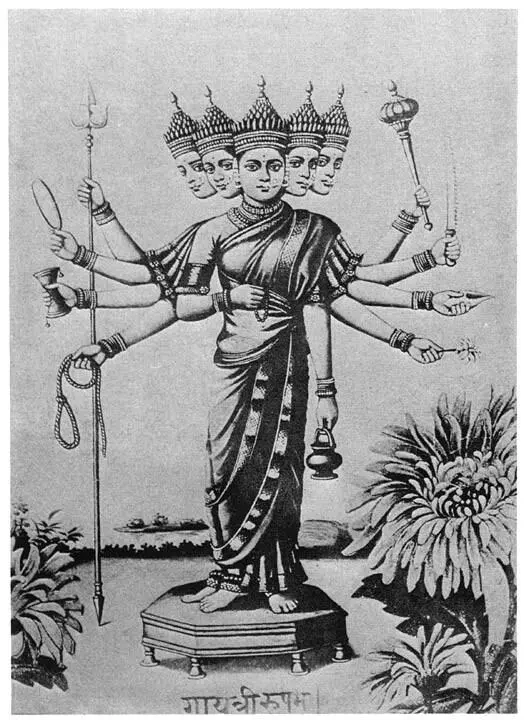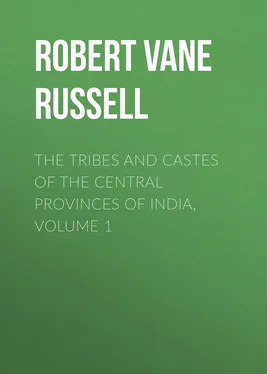Robert Vane Russell - The Tribes and Castes of the Central Provinces of India, Volume 1
Здесь есть возможность читать онлайн «Robert Vane Russell - The Tribes and Castes of the Central Provinces of India, Volume 1» — ознакомительный отрывок электронной книги совершенно бесплатно, а после прочтения отрывка купить полную версию. В некоторых случаях можно слушать аудио, скачать через торрент в формате fb2 и присутствует краткое содержание. Жанр: foreign_prose, История, foreign_edu, foreign_antique, на английском языке. Описание произведения, (предисловие) а так же отзывы посетителей доступны на портале библиотеки ЛибКат.
- Название:The Tribes and Castes of the Central Provinces of India, Volume 1
- Автор:
- Жанр:
- Год:неизвестен
- ISBN:нет данных
- Рейтинг книги:5 / 5. Голосов: 1
-
Избранное:Добавить в избранное
- Отзывы:
-
Ваша оценка:
- 100
- 1
- 2
- 3
- 4
- 5
The Tribes and Castes of the Central Provinces of India, Volume 1: краткое содержание, описание и аннотация
Предлагаем к чтению аннотацию, описание, краткое содержание или предисловие (зависит от того, что написал сам автор книги «The Tribes and Castes of the Central Provinces of India, Volume 1»). Если вы не нашли необходимую информацию о книге — напишите в комментариях, мы постараемся отыскать её.
The Tribes and Castes of the Central Provinces of India, Volume 1 — читать онлайн ознакомительный отрывок
Ниже представлен текст книги, разбитый по страницам. Система сохранения места последней прочитанной страницы, позволяет с удобством читать онлайн бесплатно книгу «The Tribes and Castes of the Central Provinces of India, Volume 1», без необходимости каждый раз заново искать на чём Вы остановились. Поставьте закладку, и сможете в любой момент перейти на страницу, на которой закончили чтение.
Интервал:
Закладка:
56. Concrete nature of primitive ideas
The primitive languages consisted only of nouns or the names of visible objects, possibly with the subsequent addition of a few names for such conceptions as the wind and the voice, which could be heard, but not seen. There were no abstract nor semi-abstract terms nor parts of speech. The resulting inability to realise any abstract conception and the tendency to make everything concrete is a principal and salient characteristic of ethnology and primitive religion. 111 111 See also Primitive Culture , i. p. 408.
All actions are judged by their concrete aspect or effects and not by the motives which prompted them, nor the results which they produce. For a Hindu to let a cow die with a rope round its neck is a grave caste offence, apparently because an indignity is thus offered to the sacred animal, but it is no offence to let a cow starve to death. A girl may be married to inanimate objects as already seen, or to an old man or a relative without any intention that she shall live with him as a wife, but simply so that she may be married before reaching puberty. If she goes through the ceremony of marriage she is held to be married. Yet the motive for infant-marriage is held to be that a girl should begin to bear children as soon as she is physically capable of doing so, and such a marriage is useless from this point of view. Some castes who cannot afford to burn a corpse hold a lighted brand to it or kindle a little fire on the grave and consider this equivalent to cremation. Promises are considered as concrete; among some Hindus promises are tied up in knots of cloth, and when they are discharged the knots are untied. Mr. S.C. Roy says of the Oraons: “Contracts are even to this day generally not written but acted. Thus a lease of land is made by the lessor handing over a clod of earth (which symbolises land) to the lessee; a contract of sale of cattle is entered into by handing over to the buyer a few blades of grass (which symbolise so many heads of cattle); a contract of payment of bride-price is made by the bridegroom’s father or other relative handing over a number of baris or small cakes of pulse (which symbolise so many rupees) to the bride’s father or other relative; and a contract of service is made by the mistress of the house anointing the head of the intended servant with oil, and making a present of a few pice, and entertaining him to a feast, thus signifying that he would receive food, lodging and some pay.” 112 112 The Oraons , pp. 408, 409.
Thus an abstract agreement is not considered sufficient for a contract; in each case it must be ratified by a concrete act.

Gāyatri or sacred verse personified as a goddess
The divisions of time are considered in a concrete sense. The fortnight or Nakshatra is presided over by its constellation, and this is held to be a nymph or goddess, who controls events during its course. Similarly, as shown in The Golden Bough , 113 113 2nd ed. vol. ii. p. 457 et seq.
many kinds of new enterprises should be begun in the fortnight of the waxing moon, not in that of the waning moon. Days are also thought to be concrete and governed by their planets, and from this idea come all the superstitions about lucky and unlucky days. If a day had been from the beginning realised as a simple division of time no such superstitions could exist. Events, so far as they are conceived of, are also considered in a concrete sense. The reason why omens were so often drawn from birds 114 114 For instances of omens see article Thug and Index. Also Miss Harrison’s Themis , pp. 98, 99.
is perhaps that birds fly from a distance and hence are able to see coming events on their way; and the hare and donkey were important animals of augury, perhaps because, on account of their long ears, they were credited with abnormally acute hearing, which would enable them to hear the sound of coming events before ordinary people. The proverb ‘Coming events cast their shadows before,’ appears to be a survival of this mode of belief, as it is obvious that that which has no substance cannot cast a shadow.
The whole category of superstitions about the evil eye arises from the belief that the glance of the eye is a concrete thing which strikes the person or object towards which it is directed like a dart. The theory that the injury is caused through the malice or envy of the person casting the evil eye seems to be derivative and explanatory. If a stranger’s glance falls on the food of a Rāmānuji Brāhman while it is being cooked, the food becomes polluted and must be buried in the ground. Here it is clear that the glance of the eye is equivalent to real contact of some part of the stranger’s body, which would pollute the food. In asking for leave in order to nurse his brother who was seriously ill but could obtain no advantage from medical treatment, a Hindu clerk explained that the sick man had been pierced by the evil glance of some woman.
57. Words and names concrete
Similarly words were considered to have a concrete force, so that the mere repetition of words produced an effect analogous to their sense. The purely mechanical repetition of prayers was held to be a virtuous act, and this idea was carried to the most absurd length in the Buddhist’s praying-wheel, where merit was acquired by causing the wheel with prayers inscribed on its surface to revolve in a waterfall. The wearing of strips of paper, containing sacred texts, as amulets on the body is based on this belief, and some Muhammadans will wash off the ink from paper containing a verse of the Korān and drink the mixture under the impression that it will do them good. Here the belief in the concrete virtue and substance of the written word is very clear. The Hindus think that the continued repetition of the Gayatri or sacred prayer to the sun is a means of acquiring virtue, and the prayer is personified as a goddess. The enunciation of the sacred syllable Aum or Om is supposed to have the most powerful results. Homer’s phrase ‘winged words’ perhaps recalls the period when the words were considered as physical entities which actually travelled through the air from the speaker to the hearer and were called winged because they went so fast. A Korku clan has the name lobo which means a piece of cloth. But the word lobo also signifies ‘to leak.’ If a person says a sentence containing the word lobo in either signification before a member of the clan while he is eating, he will throw away the food before him as if it were contaminated and prepare a meal afresh. Here it is clear that the Korku pays no regard to the sense but solely to the word or sound. This belief in the concrete force of words has had the most important effects both in law and religion. The earliest codes of law were held to be commands of the god and claimed obedience on this ground. The binding force of the law rested in the words and not in the sense because the words were held to be those of the god and to partake of his divine nature. In ancient Rome the citizen had to take care to know the words of the law and to state them exactly. If he used one wrong word the law gave him no assistance. “Gaius tells a story of a man whose neighbour had cut his vines; the facts were clear; he stated the law applying to his case, but he said vines, whereas the law said trees; he lost his suit.” 115 115 La Cité Antique , p. 225.
The divine virtue attached to the sacred books of different religions rests on the same belief. Frequently the books themselves are worshipped, and it was held that they could not be translated because the sanctity resided in the actual words and would be lost if other words were used. The efficacy of spells and invocations seems to depend mainly on this belief in the concrete power of words. If one knows an efficacious form of words connoting a state of physical facts and repeats it with the proper accessory conditions, then that state of facts is actually caused to exist; and if one knows a man’s name and calls on him with a form of words efficacious to compel attendance, he has to come and his spirit can similarly be summoned from the dead. When a Malay wishes to kill an enemy he makes an image of the man, transfixes or otherwise injures it, and buries it on the path over which the enemy will tread. As he buries it with the impression that he will thereby cause the enemy to die and likewise be buried, he says:
Интервал:
Закладка:
Похожие книги на «The Tribes and Castes of the Central Provinces of India, Volume 1»
Представляем Вашему вниманию похожие книги на «The Tribes and Castes of the Central Provinces of India, Volume 1» списком для выбора. Мы отобрали схожую по названию и смыслу литературу в надежде предоставить читателям больше вариантов отыскать новые, интересные, ещё непрочитанные произведения.
Обсуждение, отзывы о книге «The Tribes and Castes of the Central Provinces of India, Volume 1» и просто собственные мнения читателей. Оставьте ваши комментарии, напишите, что Вы думаете о произведении, его смысле или главных героях. Укажите что конкретно понравилось, а что нет, и почему Вы так считаете.












